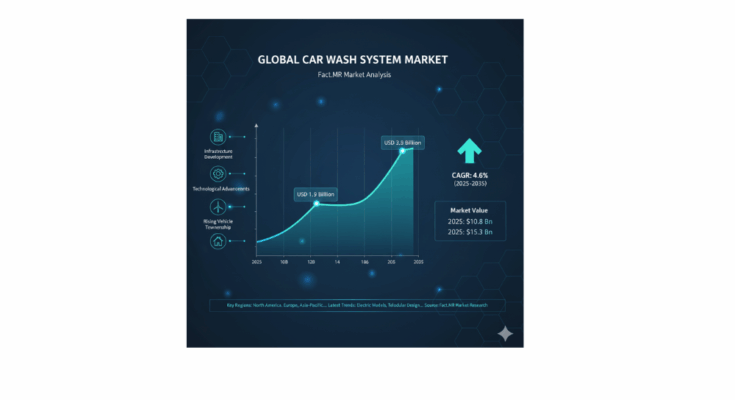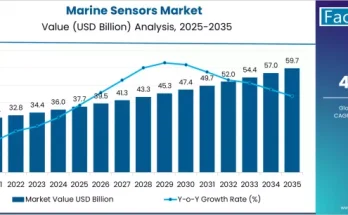The global car wash system market is on a strong growth trajectory, expected to rise from USD 1.9 billion in 2025 to USD 3 billion by 2035, registering a compound annual growth rate (CAGR) of 4.6%, according to the latest research by Fact.MR, a leading market intelligence firm. Growth is driven by rising urban populations, increasing vehicle ownership, and evolving consumer preferences for convenience, time efficiency, and eco-friendly solutions.
Car wash systems—ranging from automatic in-bay systems to conveyor tunnel washes—offer fast, consistent, and environmentally conscious vehicle cleaning, making them increasingly indispensable in densely populated urban areas and high-traffic commercial locations.
Market Growth Driven by Urbanization and Consumer Convenience
The surge in market demand is primarily fueled by urban expansion, rising vehicle ownership, and the growing popularity of subscription-based services. In Asia Pacific alone, passenger car numbers are projected to surpass 1.45 billion by 2025, according to the International Energy Agency (IEA), creating a substantial customer base for professional car wash services.
Consumers are shifting from manual, at-home car washing to automated, express, and subscription models due to time constraints, limited space, and environmental regulations. Industry data from the International Carwash Association (ICA) shows that 77% of drivers now prefer professional car washes, compared to just 48% in the early 2000s. Leading operators in North America, such as Mister Car Wash and Zips Car Wash, report that over 70% of revenue is generated through recurring membership programs, highlighting the importance of predictable cash flow and customer loyalty.
Technological innovations, including touchless systems, water recycling modules, and AI-integrated operations, are further enhancing efficiency, service quality, and customer appeal. These advancements cater to the modern consumer’s preference for hygienic, quick, and environmentally responsible vehicle maintenance.
Regional Insights: North America Leads While Asia Pacific Emerges
In 2025, North America held the largest share of the global car wash system market, supported by high vehicle ownership per capita, well-developed automotive infrastructure, and widespread adoption of automated systems. Subscription-based unlimited wash programs and express services are particularly popular among time-conscious consumers, driving revenue growth.
Europe represents a substantial market, propelled by environmental regulations restricting water usage for personal car washing and the rising adoption of electric vehicles requiring regular exterior maintenance. Urban residents increasingly rely on professional car wash systems that comply with legal and environmental standards while providing convenience and efficiency.
From 2025 to 2035, Asia Pacific is projected to witness the fastest market growth, fueled by urbanization, rising disposable incomes, and expanding middle-class populations. In major cities, automated and high-quality car wash solutions are becoming a preferred option, as consumers prioritize vehicle appearance, hygiene, and eco-friendly practices.
For example, in January 2025, SunCar Technology Group partnered with Walmart China to launch the Sam’s Club Premium Membership Car Wash Project across 17 cities, highlighting the region’s focus on advanced automation, service efficiency, and premium customer experiences.
Country-Specific Outlooks
- United States: The market is expanding due to automation, AI integration, and subscription services, with approximately 66% of vehicle owners washing their cars once or twice per month. Leading companies like Kärcher and KKE offer systems capable of cleaning 50–100+ cars per hour, featuring customizable brushes, nozzles, and drying options.
- China: Market growth is driven by urbanization, rising vehicle ownership, and water-saving regulations. Tunnel and conveyor systems are gaining popularity in major cities due to speed, efficiency, and adaptability for high-density traffic.
- Japan: Demand is increasing for compact and technologically advanced systems, including touchless and membership-based models. Urban density, limited parking, and rising labor costs encourage operators to adopt automation and water-saving solutions.
Segment Analysis
- System Type: Automatic in-bay systems dominate due to space efficiency, low labor requirements, and integration with gas stations. Conveyor tunnel systems are the fastest-growing, driven by high throughput and subscription-based commercial models.
- Process: Cloth friction washing leads, while touchless systems are rapidly growing, appealing to luxury vehicle owners seeking scratch-free cleaning.
- Vehicle Type: Compact cars dominate usage, but luxury vehicles represent the fastest-growing segment, fueling demand for premium, touchless, and detailing services.
- Location: Gas stations lead adoption, while highway installations grow fastest due to logistics fleets and long-distance travel needs.
- Payment Mode: Cash remains dominant in developing regions, while digital and cashless payments expand rapidly in urban centers.
- Sales Channel: OEMs dominate with integrated systems, while the aftermarket segment grows fastest, offering flexibility, customization, and cost-effective solutions.
Challenges and Market Restraints
The car wash system market faces challenges including:
- High upfront investment and operational costs, particularly for automated or tunnel systems.
- Limited urban space restricting facility expansion.
- Regulatory compliance for water usage, waste management, and sustainability.
- Labor cost pressures in mature markets, accelerating the shift toward automation.
Despite these challenges, rising vehicle ownership, urbanization, and consumer preference for convenience continue to propel market expansion globally.
Competitive Landscape
The market is highly competitive, with leading players WashTec, Otto Christ, Daifuku, Istobal, Ryko, Washworld Inc., MK Seiko, Autoequip Lavaggi, and PECO Car Wash Systems investing in automation, touchless technologies, water recycling, and digital payment integration. Subscription-based and membership models are fostering customer loyalty and predictable revenue streams, while premium and eco-friendly solutions are differentiating competitors in a crowded market.
Recent developments highlight technological innovation and strategic expansion:
- Shinewash Technology (Feb 2025): Showcased AI-powered tunnel car wash systems with energy and water-saving features.
- Come In Wash (July 2024): Expanded internationally with no-touch, no-brush systems, enabling unmanned 24/7 operation.
Conclusion
The global car wash system market is poised for sustained growth over the next decade, driven by urbanization, vehicle proliferation, and evolving consumer expectations. Manufacturers and operators investing in automation, eco-friendly solutions, and subscription models are well-positioned to capture market share, ensuring efficient, reliable, and environmentally responsible vehicle cleaning services for an increasingly urbanized and time-conscious population.
Browse Full Report : https://www.factmr.com/report/394/car-wash-systems-market



